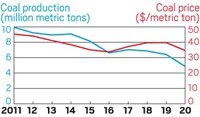Advertisement
Grab your lab coat. Let's get started
Welcome!
Welcome!
Create an account below to get 6 C&EN articles per month, receive newsletters and more - all free.
It seems this is your first time logging in online. Please enter the following information to continue.
As an ACS member you automatically get access to this site. All we need is few more details to create your reading experience.
Not you? Sign in with a different account.
Not you? Sign in with a different account.
ERROR 1
ERROR 1
ERROR 2
ERROR 2
ERROR 2
ERROR 2
ERROR 2
Password and Confirm password must match.
If you have an ACS member number, please enter it here so we can link this account to your membership. (optional)
ERROR 2
ACS values your privacy. By submitting your information, you are gaining access to C&EN and subscribing to our weekly newsletter. We use the information you provide to make your reading experience better, and we will never sell your data to third party members.
Business
Kuraray snags Calgon Carbon for $1.1 billion
Japanese acquirer says the activated carbon maker will make it a global force in filtration media
by Marc S. Reisch
September 21, 2017
| A version of this story appeared in
Volume 95, Issue 38

Japan’s Kuraray has reached a deal to acquire the Pittsburgh-based activated carbon maker Calgon Carbon for $1.1 billion. The agreement brings the last large independent U.S. activated carbon maker under the wings of a diversified parent.
Under the terms of the transaction, Kuraray will pay Calgon shareholders $21.50 per share in cash, a more-than-60% premium to Calgon’s stock price before the deal was announced.
Activated carbon is a highly porous form of carbon used in purification and filtration. After the merger, which is expected to close at the end of December, Calgon will be a Kuraray subsidiary and serve as the headquarters of a global business that provides filtration media, services, and equipment to water treatment customers.
Calgon had net income last year of nearly $14 million on sales of $514 million. It operates 20 facilities around the world and employs 1,400 people. It will join a company that has 8,600 employees and earned $348 million on sales of $4.2 billion from a variety of materials, including activated carbon.
Calgon CEO Randy Dearth says the merger will make his company part of a “much larger, stronger, global company.” Dearth, who will remain after the merger, has led Calgon through both difficult and expansive times.
He fended off activist investor Starboard Value in 2013 and expanded the firm with the purchase of Arkema’s activated carbon business last year. He also kept it independent while competitors Norit and Sorbent Technologies were acquired by Cabot and Albemarle, respectively.
Following the acquisition, Kuraray says it will reduce costs “by optimizing manufacturing facilities.” But the Japanese firm also hopes to expand business opportunities and speed innovation by combining its own R&D expertise with Calgon’s.



Join the conversation
Contact the reporter
Submit a Letter to the Editor for publication
Engage with us on Twitter